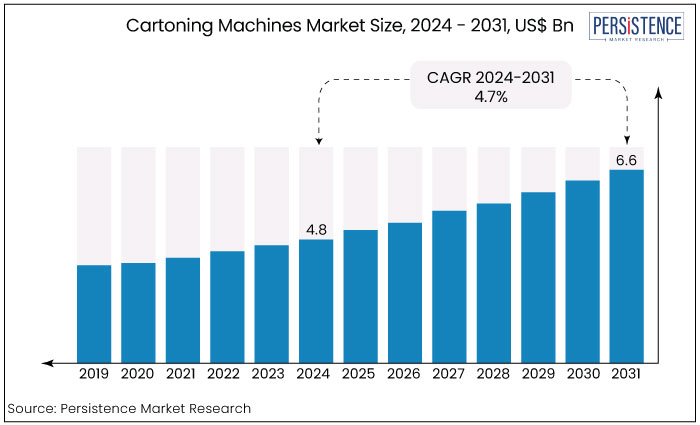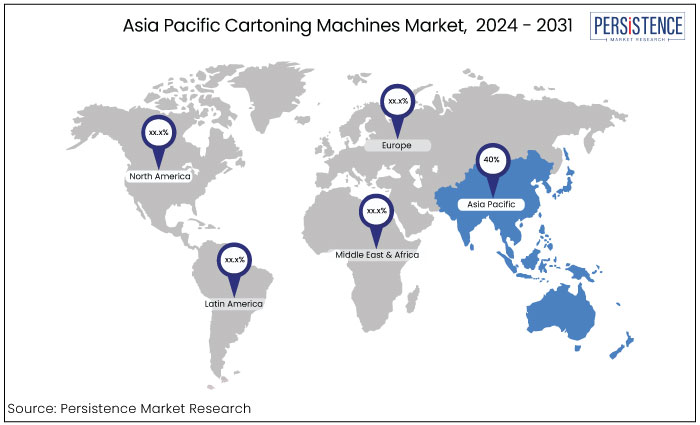Industry: Packaging
Published Date: October-2024
Format: PPT*, PDF, EXCEL
Delivery Timelines: Contact Sales
Number of Pages: 179
Report ID: PMRREP34858
The cartoning machines market is estimated to increase from US$4.8 Bn in 2024 to US$6.6 Bn by 2031. The market is projected to record a CAGR of 4.7% during the forecast period from 2024 to 2031. The market is driven by sustainability trends, and rising demand for customized packaging.

Key Highlights of the Market
|
Market Attributes |
Key Insights |
|
Cartoning Machines Market Size (2024E) |
US$4.8 Bn |
|
Projected Market Value (2031F) |
US$6.6 Bn |
|
Global Market Growth Rate (CAGR 2024 to 2031) |
4.7% |
|
Historical Market Growth Rate (CAGR 2019 to 2023) |
1.4% |
|
Region |
Market Share in 2024 |
|
Asia Pacific |
40% |
Asia Pacific market has experienced substantial growth in recent years. The region's swift modernization and rising demand for consumer products have propelled this expansion. The need for cartoning machines has increased as more organizations implement automated packing solutions.
The pharmaceutical industry's substantial regional expansion has enhanced the market, with rigorous packaging rules requiring sophisticated cartoning technology. The growth of e-commerce in Asia has intensified the emphasis on efficient packaging solutions presenting the potential for cartoning machine manufacturers to exploit this burgeoning industry.
Asia Pacific region is projected to grow substantially due to the rising need for innovative packaging solutions across various industries including food and beverage. Countries like China and India are concentrating on advanced technologies such as carton 4.0 and push-button switching technology to enhance income generation. Furthermore, the growing demand is due to the expansion of e-commerce solutions in the region.

|
Category |
Market Share in 2024 |
|
Machine Type - Horizontal |
60% |
The market is divided into vertical and horizontal based on machine type. Among these, the horizontal machine type segment dominates the market. Horizontal cartoning machines often lead to sales in the cartoning machine market due to their numerous significant advantages.
Horizontal machines are optimal for high-speed production lines rendering them ideal for industries with significant packing requirements. Their dynamic motion architecture facilitates accelerated processing and enhanced output efficiency.
The horizontal cartoners possess the versatility to suit diverse product sizes and shapes. Manufacturers of cartoning machines that accommodate diverse items are attracted to this versatility.
The enhanced visibility provided by horizontal cartoning machines during packaging facilitates monitoring and sustains efficiency for workers. All of these factors affect the market appeal of horizontal cartoning machines.
|
Category |
Market Share in 2024 |
|
End User - Food & Beverages |
37% |
The market is classified into food & beverages, pharmaceuticals, and cosmetics based on end user. Among these, the food and beverage industry predominantly drives sales of cartoning machines due to significant criteria.
The food and beverage industry's elevated production rates and diverse product range necessitate efficient and standardized packaging processes. Cartoning machines can swiftly and effectively process a range of food items including cereals, snacks, beverages, and frozen treats.
The demand for cartooning machines capable of managing complex packaging designs and labeling is propelled by consumer preferences for attractive and informative packaging in the food sector.
The industry's emphasis on eco-friendly and sustainable packaging corresponds with the latest advancements in cartoning technology rendering it a favored choice for manufacturers in the food and beverage sector.
The implementation of globalization and governmental rules for the transportation and packaging of goods is enhancing trade and commercial contacts between the two nations, which is expected to enlarge the market for cartoning machines.
The import-export sector and emerging entrepreneurial ventures are expected to drive market expansion for cartoning machines. Utilizing a carton sealing machine is essential for ensuring the optimal safety of goods during packaging.
The market share for cartoning machines is poised for substantial growth driven by the expansion of the transportation and logistics sectors. The increasing use of wrapping, strapping, and sealing machines is expected to significantly boost cartoning machine sales throughout the projection period instilling a sense of optimism in the market's future.
Companies are transitioning to automated production systems with limited human involvement. The cartoning machines market is anticipated to expand during the forecast period due to automation.
The integration of robotics is a prevailing trend in the cartoning machines market. Robots supplant human abilities such as memory, perception, and object recognition, resulting in more intelligent, rapid, and cost-effective processing methods in several industries.
The cartoning machines market experienced steady growth pre-2023 primarily driven by increasing automation in the packaging industry and growing demand from sectors like food & beverage, pharmaceuticals, and consumer goods.
Rising consumer preference for packaged products and the need for efficient and sustainable packaging solutions fueled the adoption of cartoning machines. Technological advancements, such as the integration of robotics and intelligent systems improved production speed and accuracy.
The market expanded at a moderate CAGR during the period between 2019 and 2023 as companies sought cost-effective packaging solutions to enhance productivity. Post-2024, the cartoning machines market is projected to experience accelerated growth due to rising global demand for automated and sustainable packaging solutions.
Factors such as increasing e-commerce activity, consumer inclination toward eco-friendly packaging, and strict government regulations on packaging waste will drive demand for advanced cartoning machines. The adoption of Industry 4.0 technologies including IoT and machine learning is likely to boost machine efficiency enabling real-time monitoring and predictive maintenance.
Innovations in biodegradable and recyclable packaging materials will further push manufacturers to upgrade their machines. The market is projected to expand at a significant CAGR of 4.7% during the period from 2024 to 2031, driven by technological advancements and sustainability trends.
Automation and Efficiency in Packaging Processes
The rising demand for automation in packaging processes is one of the key drivers of the cartoning machines market. Industries across sectors such as food & beverage, pharmaceuticals, and personal care are increasingly adopting automated cartoning machines to improve efficiency, reduce labor costs, and ensure consistent product quality.
Cartoning machines offer high-speed operation and precise folding and sealing capabilities, which streamline production and reduce downtime. In industries where product packaging is a critical aspect of supply chain management, automated cartoning machines help meet production quotas and minimize human error.
As consumer demand for packaged goods grows, manufacturers are focusing on enhancing productivity through automation, making cartoning machines an essential investment. Advancements in robotics and AI have enabled the development of smart machines that offer flexibility for different carton sizes and packaging formats, making automation a significant growth driver for the market.
Rising Demand for Sustainable Packaging Solutions
The increasing consumer preference for eco-friendly and sustainable packaging is driving growth in the cartoning machines market. As governments worldwide implement stricter environmental regulations, manufacturers are under pressure to adopt sustainable packaging practices.
Cartoning machines are being designed to handle biodegradable, recyclable, and compostable materials, aligning with global efforts to reduce plastic waste. The shift toward paper-based packaging, especially in sectors like food, cosmetics, and pharmaceuticals, has created a growing demand for cartoning machines capable of processing eco-friendly materials.
Several companies are committed to reducing their carbon footprint and improving their brand image by adopting greener packaging solutions. Cartoning machines that support minimal material waste, energy efficiency, and the ability to handle sustainable materials are becoming highly sought after driving market growth as businesses adapt to these emerging trends in packaging sustainability.
High Initial Investment and Maintenance Costs
One of the primary restraints for the cartoning machines market is the significant upfront investment required for advanced machinery. Automated and high-tech cartoning machines, especially those integrated with robotics, AI, or IoT capabilities, come with substantial costs. For small- and medium-sized manufacturers, the financial burden of acquiring and installing these machines can be a deterrent.
Cartoning machines often require specialized maintenance, which can add to operational costs over time. The need for skilled labor to operate and maintain the machines also contributes to the overall expense. As a result, small businesses particularly in developing regions may find it difficult to adopt such technology limiting market growth.
Limited Flexibility for Diverse Packaging Needs
While cartoning machines are highly efficient for mass production, they often lack the flexibility required to accommodate diverse packaging needs. Many industries, particularly those with smaller product lines or custom packaging requirements, find traditional cartoning machines less adaptable to changing demands. These machines are often designed for specific carton sizes or types, limiting their use across varying product categories.
For manufacturers that need frequent packaging adjustments or customization—common in industries like cosmetics, luxury goods, or specialty food—this lack of flexibility can be a constraint. Modifying or upgrading machines to meet different packaging formats can be costly and time-consuming.
Consequently, the rigid nature of many cartoning machines poses a challenge for companies seeking versatile and adaptable packaging solutions, particularly in industries where product variation and design differentiation are key factors.
Integration of Smart Technologies
Integrating smart technologies like the Internet of Things (IoT) and Artificial Intelligence (AI) represents a transformative opportunity in the cartoning machines market. IoT-enabled machines allow for real-time monitoring, predictive maintenance, and data analytics, significantly enhancing operational efficiency.
Manufacturers can remotely track machine performance, detect potential issues before they result in costly downtime, and optimize production processes. Conversely, AI can improve the precision and speed of cartoning machines, especially in sorting and quality control, reducing human error and improving output consistency. These smart technologies also enable great flexibility allowing machines to seamlessly adapt to different carton sizes and packaging formats.
As industries move toward Industry 4.0, adopting these advanced technologies can drive growth by helping companies enhance productivity reduce operational costs, and deliver customized packaging solutions.
The cartoning machines market is highly competitive, with key players such as Bosch Packaging Technology, IMA Group, Tetra Pak International, and Körber AG dominating the landscape.
Companies focus on innovations offering machines with advanced automation, IoT integration, and sustainability features to meet industry demands. Small regional players also compete by providing cost-effective and specialized solutions for niche markets.
The market experiences frequent strategic mergers and acquisitions as large companies expand their portfolios and geographic presence. Competition is intensifying as companies aim to differentiate by offering machines with increased flexibility, efficiency, and eco-friendly capabilities. Customization and modular designs are becoming key focus areas as brands seek personalized packaging solutions further driving competition in the evolving market.
Recent Industry Developments in the Cartoning Machines Market
|
Attributes |
Details |
|
Forecast Period |
2024 to 2031 |
|
Historical Data Available for |
2019 to 2023 |
|
Market Analysis |
US$ Billion for Value |
|
Key Regions Covered |
|
|
Key Market Segments Covered |
|
|
Key Companies Profiled in the Report |
|
|
Report Coverage |
|
|
Customization & Pricing |
Available upon request |
By Machine Type
By Packaging
By End User
By Region
To know more about delivery timeline for this report Contact Sales

The market is estimated to be valued at US$6.6 Bn by 2031.
The market is estimated to secure a CAGR of 4.7% over the forecast period.
A few of the leading key players in the market are Betti s.r.l., Bivans Corporation, and Trustar Pharma & Packing Equipment Co. Ltd.
Asia Pacific region is a leading regional market for cartoning machines.
Horizontal machine type leads the market with significant market share.